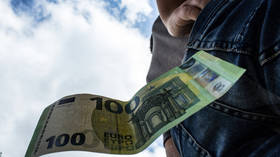Eurozone records first ever double-digit inflation

Consumer prices in the Eurozone saw massive year-on-year growth of 10% in September, marking a new record high that increases pressure on the European Central Bank (ECB) to aggressively tighten monetary policy.
Inflation across the euro area increased from August’s 9.1% print, data from Eurostat showed on Friday, beating the median forecast of 9.7%, and marking the fifth straight month of price growth outpacing analysts’ forecasts.
Inflation is still being driven by spiraling food and energy costs. Energy prices, which surged at an annual rate of 41% in September, were the main contributor to the soaring inflation in the 19 countries that use the euro. Meanwhile, prices for unprocessed food rose 13%.
Excluding volatile food and energy prices, inflation still soared to 6.1% from 5.5% in August, while an even narrower measure that also excludes alcohol and tobacco rose to 4.8% from 4.3%.
Estonia, Lithuania, and Latvia all registered inflation rates above 22%. The figure for the Netherlands came in at 17.1%, up from below 14% in August. Slovakia’s 13.6% reading also put it in the group of those with higher than average price growth.
Earlier this week, Germany reported year-on-year growth of 10.9% in September, up from 8.8% recorded in the previous month. Soaring food and energy prices were also the culprits in the rise.
The concerning inflation readings are adding to the urgency for more rate hikes, even after the aggressive moves made by the ECB in July and September. After today’s inflation print, calls will likely grow louder for another large move at the ECB’s next scheduled meeting on October 27.
Investors now see the 0.75% deposit rate rising to around 2% by the end of the year, then to around 3% next spring before levelling off.
For more stories on economy & finance visit RT's business section













